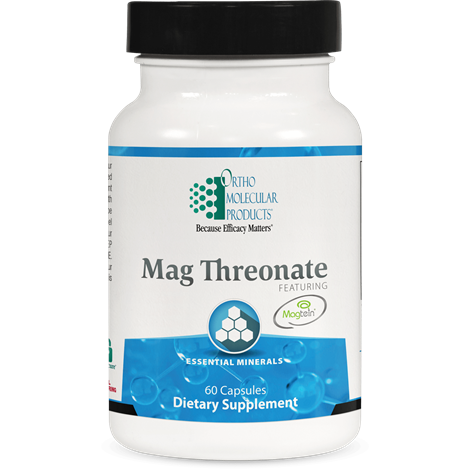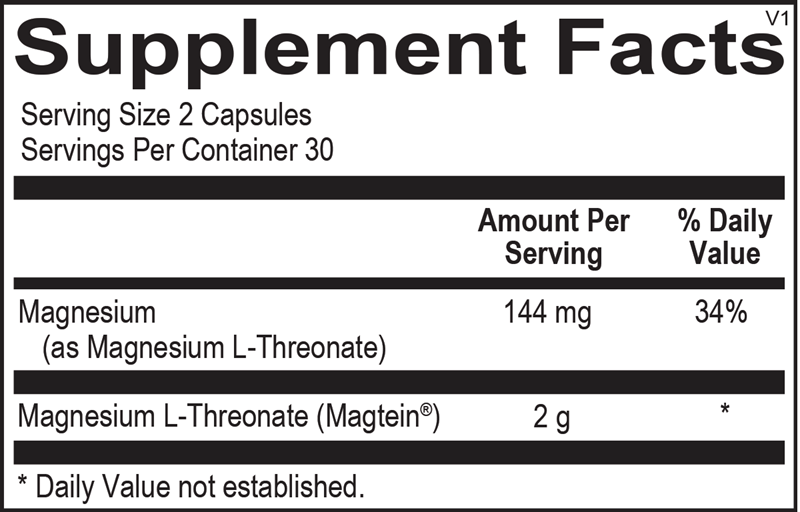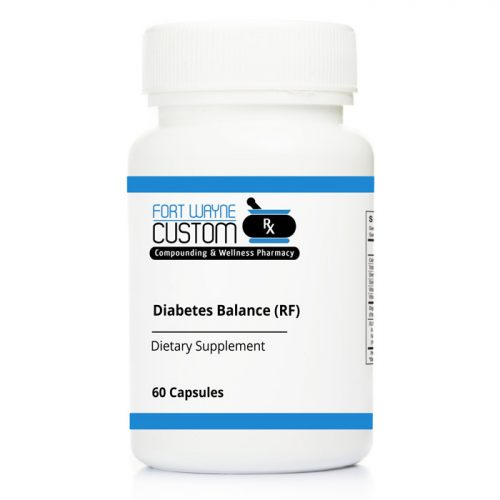Description
Mag Threonate provides unique, multidimensional support to promote healthy brain function. The formula is composed of magnesium L-threonate, the only form of magnesium known to enhance delivery of magnesium into the brain. Increased intraneuronal magnesium has been scientifically demonstrated to support neuroplasticity and mental focus, and improve memory in the aging brain. Additionally, it promotes improved quality of life by supporting a balanced sleep-wake cycle and mood. Mag Threonate can also help alleviate occasional nervousness and stress. Mag Threonate delivers 2 g of concentrated magnesium L-threonate in only two capsules.
Overview
Magnesium is one of the most important minerals for human physiology, serving as a cofactor in over 300 enzymatic reactions. A contributing factor to low magnesium intake is the significant decline of 80-90% of magnesium content in produce compared to 100 years ago. Additionally, magnesium status can be negatively impacted by aging, certain health conditions, medications, exercise, and diets high in soft drinks, caffeine, alcohol, sodium, calcium, and excessive protein. Poor magnesium status is associated with several health concerns, such as occasional headaches, poor cognition, poor concentration, low mood, nervousness, suboptimal blood pressure, and altered insulin response.
Magnesium and the Brain: The Threonate Difference
Magnesium status is an assessment challenge due to its tight regulation in serum. A sufficient level of magnesium is essential for the health and function of the brain. Some of its most important functions are protecting the integrity of the blood-brain barrier (BBB), serving as a cofactor for neurotransmitter synthesis, and modulating receptors. The transportation of magnesium into the brain is normally a restricted process due to the tight regulation of magnesium in blood. In 2010, researchers at the Massachusetts Institute of Technology (MIT) published their novel discovery of magnesium L-threonate (MgT), the only magnesium complex shown to specifically increase magnesium levels within the brain. MgT has been found to increase magnesium concentration in the cerebrospinal fluid (CSF) after only two weeks with doses of 108-144 mg of elemental magnesium, three times less than the current recommended daily allowance.
Sleep Quality
Poor sleep affects 62% of adults worldwide. Insufficient magnesium intake and poor sleep have been correlated in several studies. Some mechanisms to explain the connection between poor sleep and inadequate magnesium include magnesium’s ability to bind gamma-aminobutyric acid (GABA) receptors, attenuate the stress response, or serve as a cofactor in melatonin synthesis. In a study of 76 adults with sleep disturbances, 1 g of MgT resulted in significant improvement in several sleep variables. Participants reported improved sleep quality, faster time falling asleep, and improved time spent asleep. Additionally, they reported improved mood and mental alertness. Concomitant Oura Ring data supported their reports, indicating the MgT group had better improvement of REM, light, and deep sleep compared to those receiving placebo.
Mental-Emotional Health
A 2023 survey reported that 49% of adults in the United States report frequent stress. Low magnesium has been found in up to 60% of people reporting long-term stress. In a study of men, the group receiving supplemental magnesium had lower levels of the stress hormone cortisol compared to those receiving placebo. Symptoms of low mood and nervousness can occur independently of stress but are often experienced simultaneously. In the brain, magnesium supports mood and emotional health by acting as a cofactor for the synthesis of dopamine and serotonin, inhibiting the release of excitatory glutamate, and binding calming GABA receptors. In a study of older adults with stress and nervousness, participants who received either 1.5 or 2 g of MgT had significant improvement in stress, nervousness, and fear symptoms compared to the placebo group.
Memory and Concentration
Memory and mental focus are common concerns. In an animal model, MgT was found to increase the synaptic density and function of neurons in the brain. Additionally, treatment of hippocampal cells with MgT resulted in increased mitochondrial density and function. In a study of adults with mental focus concerns, the majority who received MgT daily demonstrated improvement in IQ and attention. A decline in neuronal synapses, their function, and consequent atrophy of the brain are associated with impaired cognition, a process that increases with age. In a study of older adults with memory concerns, those who received 1.5 to 2 g of MgT daily demonstrated improvement in executive function, working (short-term) and episodic memory. In another eight-week study of older adults, those receiving MgT had statistically significant improvement on their MMSE (Mini-Mental State Examination) score.
† These statements have not been evaluated by the Food and Drug Administration. This product is not intended to diagnose, treat, cure, or prevent any disease. †





